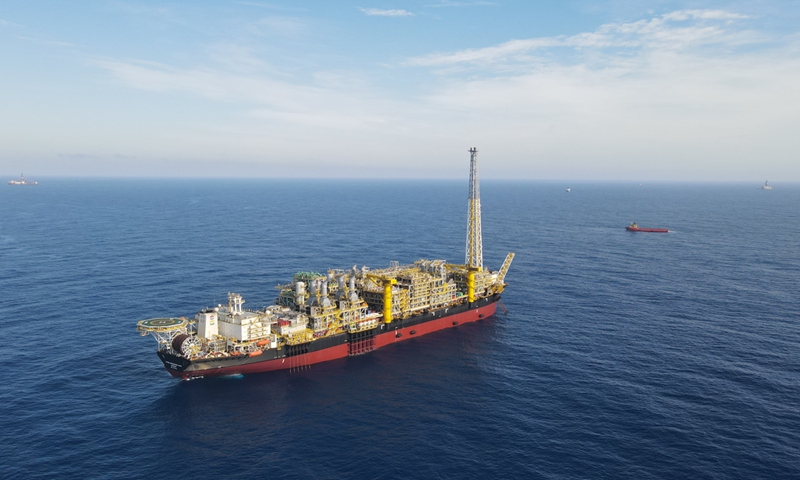
The FPSO vessel-Guanabara used for the Mero project Photo: Courtesy of MODEC
Phase one of Mero, a global giant subsalt ultra-deepwater oil field jointly developed by China National Offshore Oil Corp (CNOOC), has gone into production in Brazil, the company told the Global Times.
Analysts have stressed the significance of exploring offshore oil resources as China remains highly dependent on imported oil. Stepping up efforts to promote oil production on land and in the sea will further strengthen the nation's energy security.
The Mero oil field is part of Brazil's giant offshore field called Libra Block, the third-largest subsalt ultra-deepwater oil field in the world.
The project is an important achievement for in-depth cooperation between China and Brazil, and a significant growth point for China's overseas oil and gas production, the company said on Tuesday. The project will boost the sustainable development of the local economy, while promoting the construction of the China-proposed Belt and Road Initiative and international energy cooperation.
Huang Yehua, a manager from CNOOC's Brazil subsidy, said that the Mero field is being developed in four phases, with a subsea production system and a floating production storage and offloading facility. Total investment in the project has exceeded $20 billion, and phase one will have a capacity of 180,000 barrels of crude oil per day after it's put into full production.
Subsalt ultra-deepwater oil fields are an emerging field in the global oil industry and an important trend for future development, accounting for one-third of the world's oil reserves, according to CNOOC.
The output of Brazil's subsalt ultra-deepwater oil fields is leading in the world.
Mero's phase one going into production shows that CNOOC has ramped up its technology in the sector and enhanced its competitiveness in marine operations, Lin Boqiang, director of the China Center for Energy Economics Research at Xiamen University, told the Global Times on Wednesday, noting that China's ocean drilling technology is globally advanced.
Lin said that tapping into subsea oil resources will be a trend in the coming years with a great market potential, especially amid surging global oil prices.
The company currently holds a 9.65 percent stake in the Mero field, and it acquired a stake in the Búzios field in Brazil in 2021, the world's largest deepwater oil field. CNOOC currently owns five deepwater oil and gas block assets in Brazil.
In 2013, CNOOC, Petrobras, Shell, TotalEnergies and China National Petroleum Corp formed a consortium to win the Libra block, entering the Brazilian subsalt ultra-deepwater oil and gas field for the first time.
Global Times




